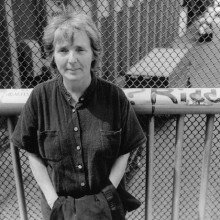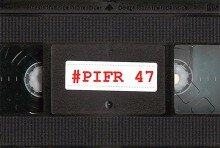
Fanny Howe is the author of more than twenty books of poetry and prose. In a 2004 interview with the Kenyon Review Howe said, “If someone is alone reading my poems, I hope it would be like reading someone’s notebook. A record. Of a place, beauty, difficulty. A familiar daily struggle.” Indeed, more than a subject or theme, the process of recording experience is central to Howe’s poetry. Her work explores grammatical possibilities, and its rhythms are generated from associative images and sounds.
Writing for the Constant Critic, Jordan Davis lauds the manner in which revelatory thought is presented in Gone (2003): “Howe enacts what the South American poet Jorge Guinheime called hasosismo, or the art of the fallen limb, in which startling insights emerge and are subsequently concealed.” Elsbeth Pancrazi, reviewing Howe’s most recent book of poems for BOMB Magazine, seems to pinpoint the effect of this combination. Pancrazi writes: “Come and See is an argument for a kind of art that teaches us to contain a large amount of uncertainty.” In these lines from ‘A Hymn,’ uncertainty is both directly addressed and inherent in the poem, itself:
I wonder, will our imagination
remain a temple burning with candles
against all odds?
Behind a nipple and a bone?
As Pancrazi states, “Howe’s proclamatory statements, aimed at truth, come out cryptic, their meanings warped by strange choices of grammar and tense. Truth is fugitive – [about] whether Howe is pursuing it or trying to outrun it, the reader, following her traces, cannot be sure.” Although Howe renders a clear image in the lines above, it is not clear what threatens the imagination or what exactly is meant by “our” imagination. Howe’s poems are dense with meaning and human struggle, and the ability to contain uncertainty is articulated through the questions and images in the poems, but also by the ways in which Howe’s poems work.
Howe’s work is marked by both religion and science. As Daniel DeKerlegand noted in the Volta, “For Howe, the trauma of sight is rendered religiously, such as in the poem ‘On the Wall’ where ‘A map of heaven/ shows clouds/ for each soul/ being prayed for.’” If sight is rendered religiously, faith is also rendered through a scientific lens, as it is in ‘A Hymn’:
History is more than just another surmising
grandmother at a window
or a reminiscence twisted in the scrim of translation.
Some long-ago light is pulsating in a trout’s heart
on a laboratory dish.
That light has entered all the holes,
no matter how small, because it is the light that wants to live.
Michael Robbins, reviewing Come and See for Poetry magazine, stated, “For forty years, Howe has been filing quietly devastating reports from the fluid borders of faith and doubt, her eye trained on the traditional material of the lyric, her ear tuned to more modern stations.” One of those “modern stations” is the dark and wry humor Howe delights with in poems like ‘Everything’:
Yet a fresh light was shed
on immortality
for me climbing the stairs
firm foot first.
Everything was in the banister:
crows on branches, crickets,
architects, handsaws and democrats.
Red moon at 3 AM.
Fanny Howe’s recent collections of poetry include Come and See: Poems (2011), The Lyrics (2007) On the Ground (2004), Gone (2003), and Selected Poems (2000) which won the Lenore Marshall Poetry Prize. She is also the author of several novels and prose collections, most recently Radical Love: 5 Novels (2006) The Lives of a Spirit/Glasstown: Where Something Got Broken (2005) and Economics: Stories (2002). Her essays have been published in The Winter Sun: Notes on a Vocation (2009) and The Wedding Dress: Meditations on Word and Life (2003). Howe’s next collection of poems, Second Childhood, is due out from Graywolf Press in 2014.
Howe grew up in Cambridge, Massachusetts, and has taught at MIT, Tufts University, Yale University and elsewhere. She has received awards from the National Endowment for the Arts, the Poetry Foundation, the California Council for the Arts, and the Village Voice, as well as fellowships from the Bunting Institute and the MacDowell Colony. In 2001 and 2005, Howe was shortlisted for the Griffin Poetry Prize. In 2008 she won an Award in Literature from the American Academy and Institute of Arts and Letters.
Bibliography
Poetry
Eggs: Poems, Houghton Mifflin, Boston, 1970
The Amerindian Coastline Poem, Telephone Books Press, New York, 1975
Poem from a Single Pallet, Kelsey Street Press, Berkeley, 1980
Alsace-Lorraine, Telephone Books Press, Guilford, CT, 1982
For Erato: The Meaning of Life, Tuumba Press, Berkeley, 1984
Robeson Street, Alice James Books, Cambridge, 1985
Introduction to the World, The Figures, Great Barrington, 1986
The Lives of a Spirit, Sun & Moon Press, Los Angeles, 1987
The Vineyard, Lost Roads Publishers, Providence, 1988
The End, Littoral Books, Los Angeles, 1992
The Quietist, O Books, Oakland, 1992
O'Clock, Reality Street, London, 1995
One Crossed Out, Graywolf Press, Saint Paul, 1997
Forged, Post-Apollo Press, Sausalito, 1999
Selected Poems, University of California Press, Berkeley, 2000
Gone, University of California Press, Berkeley, 2003
Tis of Thee, Atelos, Berkeley, 2003,
On the Ground, Graywolf Press, Saint Paul, 2004
The Lives of a Spirit/Glasstown: Where Something Got Broken, Nightboat Books, Beacon, 2005
The Lyrics, Graywolf Press, Saint Paul, 2007
Come and See: Poems, Graywolf Press, Saint Paul, 2011
Second Childhood, Graywolf Press, Saint Paul, 2014 (forthcoming)
Fiction
West Coast Nurse (under the pseudonym Della Field), Avon Books, New York, 1963
Vietnam Nurse (under the pseudonym Della Field), Avon Books, New York, 1966
Forty Whacks, Houghton Mifflin, Boston, 1969
First Marriage, Avon Books, New York, 1972
Bronte Wilde, Avon Books, New York, 1976
Holy Smoke, Fiction Collective, New York, 1979
The White Slave, Avon Books, New York, 1980
In the Middle of Nowhere: A Novel, Fiction Collective, 1984
The Deep North, Sun & Moon Press, Los Angeles, 1988
Famous Questions, Ballantine Books, New York, 1989
Saving History, Sun & Moon Press, Los Angeles, 1993
Nod, Sun & Moon Press, Los Angeles, 1998
Indivisible, Semiotext(e), Los Angeles, 2000
Economics: Stories, Flood Editions, Chicago, 2002
Radical Love: 5 Novels, Nightboat Books, Beacon, 2006
What Did I Do Wrong? illustrated by Colleen McCallion, Flood Editions, Chicago, 2009
Nonfiction
The Wedding Dress: Meditations on Word and Life, University of California Press, Berkeley, 2003
The Winter Sun: Notes on a Vocation, Graywolf Press, Saint Paul, 2009
Young Adult Fiction
The Blue Hills, Avon Books, New York, 1981
Yeah, But Avon Books/Flare, New York, 1982
Radio City, Avon Books/Flare, New York, 1984
Taking Care, Avon Books, New York, 1985
Race of the Radical, Viking Kestrel, New York, 1985
Essays
Poetry magazine: ‘My Father Was White but Not Quite’
Poetry magazine: ‘Outremer’
Poetry magazine: ‘Second Childhood’
Poetry magazine: ‘Buddhists Like School and I Don’t.’
Poetry magazine: ‘Because He Was Flesh: How Edward Dahlberg changed my life.’
Poetry magazine: ‘Keepers of the Image: Meditations on documenting the secret self.’
Links
PoetryFoundation.org, Poetry Off the Shelf: ‘Light in the Service of Loneliness’
PoetryFoundation.org, Poem of the Day: ‘What Did You See?’ read by Fanny Howe
The Constant Critic: ‘Gone/Economics’ by Jordan Davis
Poetry magazine: ‘Three Books’ by Michael Robbins
Kenyon Review: ‘Fanny Howe’ interviewed by Patsy Vigderman





